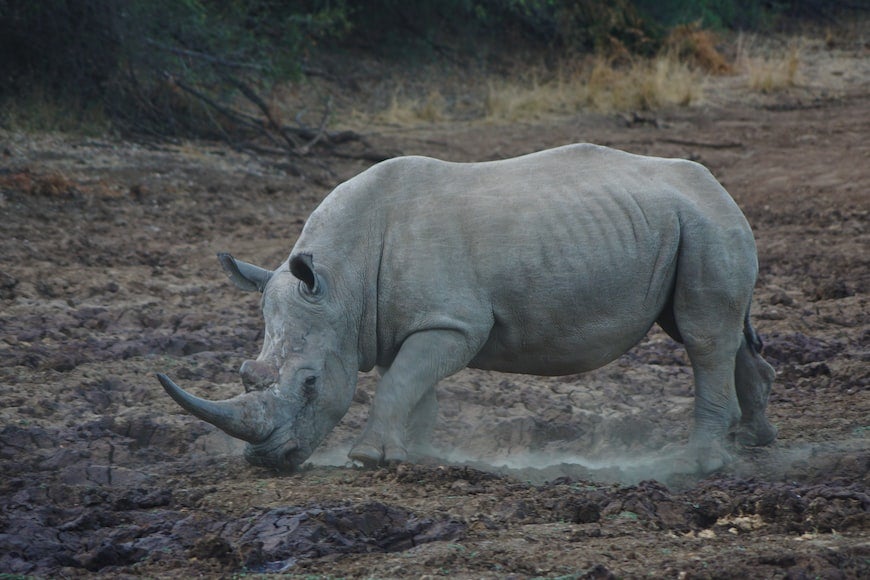Zimbabweans implicated in regional rhino poaching surge
A report by the global regulator for wildlife trade found that 90% of rhino poaching incidents between 2018 and 2021 took place in southern Africa

Your support helps us to tell the story
From reproductive rights to climate change to Big Tech, The Independent is on the ground when the story is developing. Whether it's investigating the financials of Elon Musk's pro-Trump PAC or producing our latest documentary, 'The A Word', which shines a light on the American women fighting for reproductive rights, we know how important it is to parse out the facts from the messaging.
At such a critical moment in US history, we need reporters on the ground. Your donation allows us to keep sending journalists to speak to both sides of the story.
The Independent is trusted by Americans across the entire political spectrum. And unlike many other quality news outlets, we choose not to lock Americans out of our reporting and analysis with paywalls. We believe quality journalism should be available to everyone, paid for by those who can afford it.
Your support makes all the difference.By Tatira Zwinoira for Zimbabwe Independent
Zimbabweans have been implicated as chief architects of a recent spike in rhino poaching in South Africa.
The South African Department of Correctional Services identified the Zimbabwean poachers as Nhamo Muyambo, Francis Chitho, Trymore Chauke, Lubuyo September, Abraham Moyane, Simba Masinge and Bennet Kwamle.
International Rhino Foundation (IRF) communications director Christopher Whitlatch said: “Zimbabwean rhino poachers have been involved in major illegal activities in South Africa.
“Taking the Eastern Cape as an example, the Zimbabwean rhino poaching gang that recently escaped from jail had been convicted for killing and dehorning numerous rhinos in hit-and-run incidents in that province.
“Other cross-border rhino crimes include South African criminals operating in Zimbabwe,” he said.
South Africa has an active domestic trade market for rhino horns, active since 2017, though trades have been declining since then.
Prices for rhino horns in the Southern African state range between US$1,693 (£1,380) and US$5,016 (£4,082) per kilogramme, based on a report from the Convention on International Trade in Endangered Species of Wild Fauna and Flora (CITES).
The CITES report, submitted at its just-ended annual conference, found that South Africa had 2,056 and 12,968 black and white rhinos, respectively, while Zimbabwe had 616 and 417 at the end of 2021.
In total, 22,137 rhinos were living in the African continent comprising 6,195 black and 15,942 white rhinos at the end of last year.
South African Police Service (SAPS) spokesperson Mashadi Selepe did not respond to an email sent on November 10 seeking comment on the levels of rhino poaching crimes involving Zimbabwean nationals in South Africa.
The IRF reports that the Lowveld Rhino Trust (LRT), the foundation’s partner in Zimbabwe, recorded 172 arrests of rhino poachers within Zimbabwe since mid-2007.
Of these, 23 were given bail and they all absconded, while 51 poachers were sentenced and 57 acquitted, often in controversial circumstances.
A further breakdown by the British-based rhino conservation group, Save the Rhino International (SRI), reported that between 2006 and 2021, 698 rhinos had been poached in Zimbabwe.
Meanwhile, in the period 2018 to 2021, 2,707 rhino poaching incidents were recorded in Africa, of which 90% took place in South Africa.
Between 2018 and 2020, Cites reported a total of 1,116 and 19 seizures, weighing 2.4 tonnes and 37 kilograms in South Africa and Zimbabwe, respectively.
Poaching rhinos for their horns is a result of rumoured medicinal properties contained in the horns and a status symbol associated with the horn.
A January study by researchers Hoai Nam Dang Vu, Martin Reinhardt and Jette Bredahl Jacobson from the University of Copenhagen, in Denmark, found that rhino horns fetch high prices on the black market.
The study found that rhino horns can sell for up to US$400,000 (£326,000) and US$20,000 (£16,300) per kilogramme for Asian and African rhino horns, respectively.
Vietnam and China remain the top markets for rhino horns, according to researchers. SRI communications manager Emma Pereira said: “Regarding your questions, our organisation doesn’t currently fund major research into poaching syndicates, however, we work with individuals in South Africa and Zimbabwe (amongst other countries) and from this work, we know that poaching criminals tend not to work in isolation.
“Most often, they are part of larger criminal networks, which often cross borders to work around the world illegally trafficking illegal wildlife products including rhino horn. Given the proximity of the two countries, it is likely that rhino poaching syndicates will be working together across both countries to share information,” she said.
Local wildlife legal expert advocate Ever Chinoda said Zimbabweans have been involved in hunting, transportation and exportation.
“Zimbabwe is a source country meaning the rhino horns or ivory are sourced or hunted in this country. The people doing the hunting are Zimbabweans, and the transportation and exportation Zimbabweans again,” Chinoda said.
“When it comes to the issue of Zimbabweans in other countries, involved in smuggling, I don’t know the numbers, but they are there.”
This article is reproduced here as part of the African Conservation Journalism Programme, funded in Angola, Botswana, Mozambique, and Zimbabwe by USAID’s VukaNow: Activity. Implemented by the international conservation organization Space for Giants, it aims to expand the reach of conservation and environmental journalism in Africa, and bring more African voices into the international conservation debate. Written articles from the Mozambican and Angolan cohorts are translated from Portuguese. Broadcast stories remain in the original language.
Read the original story here:
Join our commenting forum
Join thought-provoking conversations, follow other Independent readers and see their replies
Comments